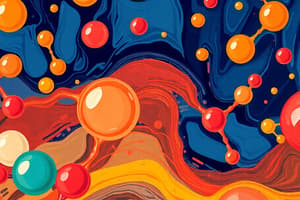Podcast
Questions and Answers
Which of the following is a characteristic of lipids?
Which of the following is a characteristic of lipids?
- Lipids are stored in the adipose tissue (correct)
- Lipids are polar molecules
- Lipids are synthesized in the kidneys
- Lipids are soluble in water
Where can lipids be found in the human body?
Where can lipids be found in the human body?
- In the liver (correct)
- In the kidneys
- In the lungs
- In the muscles
What type of molecules are lipids?
What type of molecules are lipids?
- Hydrophilic molecules
- Ionic molecules
- Nonpolar molecules (correct)
- Polar molecules
What is the function of lipids in the human body?
What is the function of lipids in the human body?
Which of the following is an example of a lipid?
Which of the following is an example of a lipid?
Which of the following is a property of lipids?
Which of the following is a property of lipids?
What is the solubility of lipids in water?
What is the solubility of lipids in water?
Where can lipids be synthesized in the human body?
Where can lipids be synthesized in the human body?
Which of the following is NOT an example of a lipid?
Which of the following is NOT an example of a lipid?
What is the main function of lipids in the human body?
What is the main function of lipids in the human body?
Flashcards
Lipid Storage
Lipid Storage
Lipids are stored in adipose tissue, providing insulation and energy reserve.
Lipids in the Liver
Lipids in the Liver
Lipids, including cholesterol, are found in the liver, playing a role in various metabolic processes.
Lipid Polarity
Lipid Polarity
Lipids are nonpolar molecules, meaning they do not have a positive or negative charge.
Lipids and Temperature
Lipids and Temperature
Signup and view all the flashcards
Cholesterol
Cholesterol
Signup and view all the flashcards
Lipid Solubility
Lipid Solubility
Signup and view all the flashcards
Lipid Synthesis Location
Lipid Synthesis Location
Signup and view all the flashcards
Lipids and Energy
Lipids and Energy
Signup and view all the flashcards
Study Notes
Characteristics of Lipids
- Lipids are non-polar molecules, which makes them insoluble in water.
- Lipids are typically hydrophobic, meaning they repel or avoid water.
Location of Lipids in the Human Body
- Lipids can be found in adipose tissue, where they are stored for energy.
- They are also found in cell membranes, where they play a structural role.
Types of Lipids
- Lipids are a type of organic molecule, composed of carbon, hydrogen, and oxygen atoms.
- Examples of lipids include triglycerides, phospholipids, and steroids.
Functions of Lipids in the Human Body
- Lipids serve as a source of energy for the body.
- They also provide insulation, regulate body temperature, and protect organs.
- Lipids are essential for the absorption of fat-soluble vitamins.
Examples of Lipids
- Examples of lipids include cholesterol, fats, and oils.
Properties of Lipids
- Lipids are typically non-polar and hydrophobic.
- They are also insoluble in water, due to their non-polar nature.
Synthesis of Lipids
- Lipids can be synthesized in the liver and adipose tissue.
Non-Examples of Lipids
- Carbohydrates, proteins, and nucleic acids are not examples of lipids.
Main Function of Lipids
- The main function of lipids is to provide energy for the body.
Studying That Suits You
Use AI to generate personalized quizzes and flashcards to suit your learning preferences.


